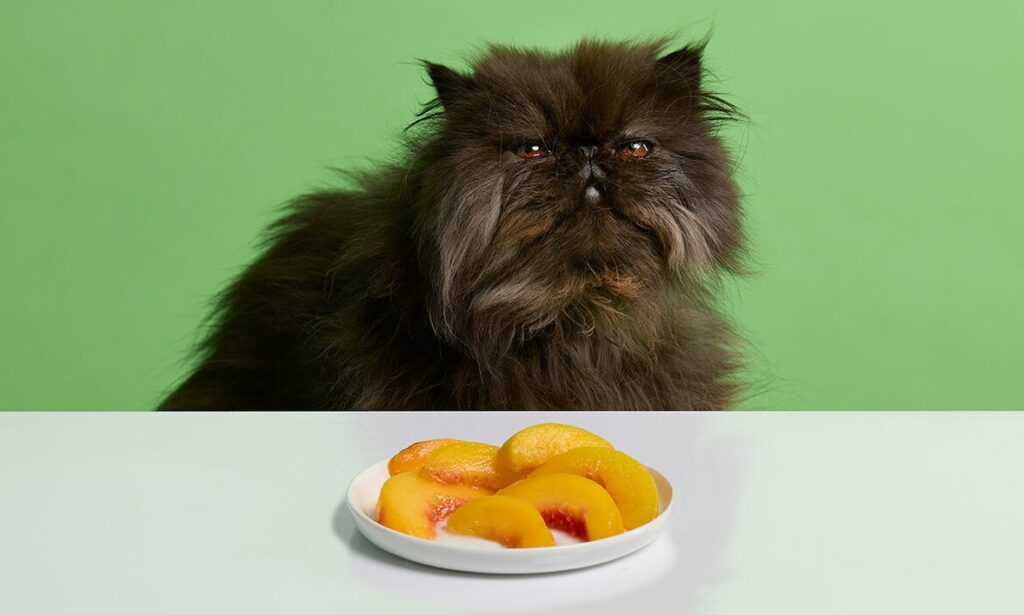Can Cats Eat Peaches?

Photo by Chewy Studios
Ah, the joy of biting into a perfectly ripe, juicy peach on a warm summer’s day. It’s a seasonal pleasure many of us humans eagerly anticipate. As you enjoy this delicious fruit—your feline companion gazing at you with those wide, curious eyes—you wonder, “Can cats eat peaches, too?”
While cats can enjoy an occasional nibble of the fleshy part of this summertime staple, there are some crucial caveats to consider—like steering clear of the pit, leaves, stem and skin.
We spoke to a vet expert to understand the dos and don’ts of sharing this sun-kissed fruit with your furry friend.
Risks of Peaches for Cats
Should you give peaches to you cat? While the flesh of peaches is nontoxic to cats, that doesn’t mean it’s an ideal treat for your kitty. Before you slice a piece for Fluffy, there are important factors to weigh.
First, let’s look at the risks associated with giving peaches to cats.
Cyanide Poisoning
The soft interior kernel of the pit contains the chemical amygdalin, which converts to hydrogen cyanide—a chemical that’s extremely toxic to cats.
For cyanide to be released, a cat must chew and break open the pit, or ingest pieces of a broken pit.
Avoid giving cats the pit.
The leaves and stems of peaches also contain cyanide and should be avoided.
Digestive Damage and Choking Hazard
Cyanide is less likely to be released if the pit is swallowed whole, but this introduces other grave concerns: choking and gastrointestinal obstruction.
If your cat swallows a whole peach pit or a piece of the pit, it can get lodged in their throat or digestive tract. This is a potentially life-threatening emergency that requires immediate medical intervention.
Though the occurrence of cats ingesting peach pits is rare, the severity of the associated risks makes it crucial to exercise caution.
Peach Skin Hazards
The skin of a peach, while not inherently dangerous to cats, can contain harmful pesticide residues. The skin’s high-fiber content may challenge your feline’s digestive system.
It’s best to avoid giving your cat peach skin entirely.
Sugar Content
Peaches are naturally rich in sugars. This makes them a tasty treat for humans, but they pose dietary concerns for cats.
Unlike humans, cats are obligate carnivores, meaning their bodies are optimized for a high-protein, low-carbohydrate diet. Their systems are not designed to process sugars efficiently.
High sugar content can be especially problematic for cats who are diabetic or prediabetic, as it can lead to spikes in blood sugar levels. Even for nondiabetic cats, frequent ingestion of sugar can contribute to weight gain and obesity, which can increase the risk of developing other health problems, like joint issues or cardiovascular disease.
Moreover, excess sugar can affect a cat’s dental health, potentially leading to issues like plaque buildup and dental decay. As dental problems are already common in domestic cats, adding sugar to the equation only exacerbates the risk.
Symptoms of Peach Poisoning in Cats
While instances of peach poisoning in cats are rare, they are serious enough to warrant immediate medical attention. If your cat has consumed any part of the peach that contains cyanide—including the pit, leaves or stem—be on the lookout for symptoms of poisoning.
Symptoms of peach poisoning in cats include:
- Loss of appetite
- Vomiting
- Diarrhea
- Drooling
- Lethargy
- Abdominal pain
- Dilated pupils
- Tremors
- Bright red gums and mucous membranes
- Difficulty breathing
- Increased heart rate
- Panting
If you think your cat consumed parts of a peach, look for any peach remnants to determine which parts of the fruit your cat ingested. If the pit is still intact, your cat is likely OK.
Take your cat to a veterinarian or the nearest pet emergency clinic immediately if:
- The peach pit appears broken or is in pieces.
- It appears your cat chewed on the pit.
- You can’t find the pit.
- You suspect your cat consumed peach leaves or stems.
- You’re unsure how much or which parts of the peach they consumed.
- Your cat is showing signs of an intestinal blockage, including loss of appetite, bloating and straining to poop.
- Your cat is showing signs of peach poisoning.
If your cat has consumed too much peach flesh, the risks are less immediate—but could lead to digestive upset due to high sugar and fiber content. In such cases, monitor your cat for signs of gastrointestinal discomfort, including vomiting or diarrhea, and consult your veterinarian for advice.
You can also call an animal poison helpline for advice, including:
- ASPCA’s Animal Poison Control Center (APCC) at (888) 426-4435
- Pet Poison Helpline at 855-764-7661
Benefits of Peaches for Cats
While there are risks to consider, sharing a small, occasional piece of peach flesh with your cat isn’t entirely without merit.
Here are some potential health benefits of peaches for cats:
Hydration
Peaches are high in water content, making them a supplementary source of hydration for your kitty.
Although plain water is undeniably the best way to keep your cat hydrated, a juicy piece of peach can offer a small but welcome boost, particularly on hot days.
Fiber
Peaches contain dietary fiber, which could aid in digestion—but it’s important to note that cats don’t have the same dietary fiber requirements as humans.
While a small amount of fiber won’t harm your cat and might even promote better digestion, consuming too much could cause an upset stomach.
Nutrients
Peaches contain antioxidants and a variety of nutrients such as vitamin A, vitamin C and potassium. However, there’s debate among veterinarians and pet nutritionists about how effectively cats can absorb nutrients from plant-based foods.
As obligate carnivores, cats are adapted to obtain their essential nutrients from animal sources. While the nutrient content in peaches may offer some benefits, the amount of nutrients absorbed is likely minimal.
How Much Peach Can I Give My Cat?
If you’d like to offer your cat peach, stick to a teaspoon-size piece of peach flesh that’s free from both the pit and skin.
If your cat enjoys it and experiences no negative side effects, you can make it an occasional treat.
Due to the fruit’s high sugar content, limit it to 1 or 2 teaspoon-size pieces per week.
FAQs About Peaches and Cats
Here are some other frequently asked questions to help fill in any gaps about cats and peaches.
Can cats eat canned peaches?
Canned peaches are not recommended for cats. Canned peaches are often preserved in a sugary syrup that is far too high in sugar for a cat’s diet. Excessive sugar can lead to health problems, such as digestive issues, obesity, dental problems and diabetes.
Can cats eat peach-flavored foods?
No, it’s best to avoid giving peach-flavored foods to your cat. These foods often contain preservatives, sugars and artificial sweeteners (like xylitol) that can be harmful or even toxic to cats.
Can cats have peach juice?
No, it’s not recommended to give your cat peach juice. Store-bought juice can contain added sugars and preservatives, which are not suitable for a cat’s diet. Even if you make homemade peach juice without added sugars, the concentrated fruit content can be too high in natural sugars for a cat.
Are any fruits toxic to cats?
Yes, some fruits are toxic to cats and should be avoided altogether. These include grapes; raisins; and citrus fruits like oranges, lemons and grapefruits. These fruits can cause digestive issues and, in some cases, more severe reactions like kidney failure.
If your cat enjoys the sweet taste of peaches, they might also enjoy small pieces of other cat-friendly fruits, including watermelon, strawberries and blueberries. Just be sure these fruits and other cat-safe human foods are given as occasional treats, not as a main course. And remember, treats should be no more than 10 percent of your cat’s daily diet.
As always, check with your veterinarian before introducing any new food into your cat’s diet.



